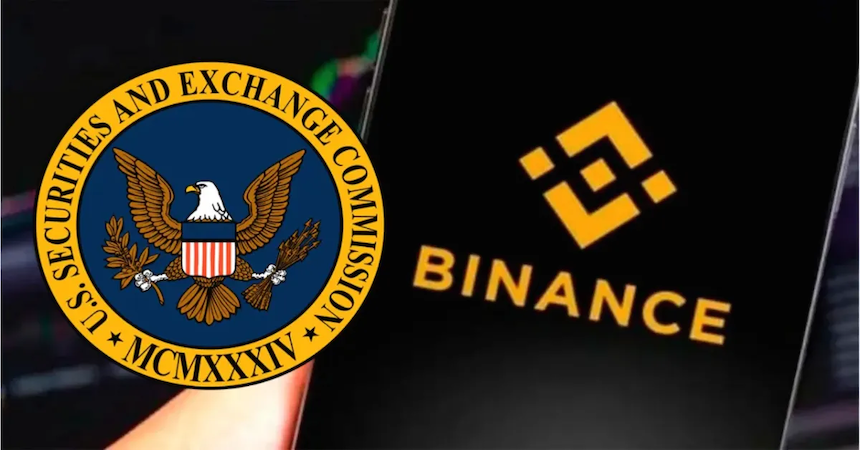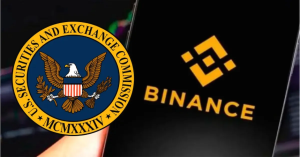Join Our Telegram channel to stay up to date on breaking news coverage
Last week, a district court judge gave the green light to the Securities and Exchange Commission (SEC) to reveal specific documents in their ongoing legal fight with Binance US. This decision followed a formal request made by the SEC to disclose these files to the public. These documents had been concealed since August, available only to legal teams connected to the case.
The SEC took action against Binance US back in June, leveling 13 different accusations at the crypto exchange, including operating without proper registration. Notably, the agency also raised concerns about customer funds being intermingled with accounts belonging to Merit Peak, an entity reportedly under the control of Changpeng Zhao, Binance’s CEO. A day after these allegations were made, the SEC aimed to halt Binance US’s assets, citing concerns for customer fund security.
Today we charged Binance Holdings Ltd. (Binance); U.S.-based affiliate, BAM Trading Services Inc., which, together with Binance, operates https://t.co/swcxioZKVP; and their founder, Changpeng Zhao, with a variety of securities law violations.https://t.co/H1wgGgR5ir pic.twitter.com/IWTb7Et86H
— U.S. Securities and Exchange Commission (@SECGov) June 5, 2023
However, an agreement was struck shortly thereafter to prevent the freeze, contingent upon Binance US agreeing to more robust transparency measures. Included in the terms was the stipulation that Zhao and any affiliated entities would not have access to these funds.
After the SEC filed its lawsuit, several key executives exited Binance US, including its CEO Brian Shroder. Changpeng Zhao, the CEO of the global Binance operation, confirmed Shroder’s departure, suggesting that Norman Reed, Binance US’s Chief Legal Officer, was aptly suited to steer the company forward.
Criticism from the SEC
The SEC has criticized Binance US‘s parent company, BAM, for only delivering 220 documents so far for scrutiny. These documents, some of which were difficult-to-decipher screenshots and undated papers, were deemed inadequate for confirming the security of BAM’s customer assets. Furthermore, Binance’s international entity, Binance Holdings Ltd, owns a wallet custody software service named Ceffu, which the SEC claims appears to manage BAM’s crypto assets.
As of the date of this filing, BAM has only produced a little over 220 documents. Many are unintelligible screenshots of bank account information, documents without dates or signatures, and letters from counsel and tables that appear to be prepared for purposes of this litigation, without any supporting evidence or verification by an individual with knowledge confirming the accuracy of the information.
BAM’s external auditor, FGMK, became another key player when it emerged that they had submitted over 6,500 documents, mostly related to how BAM handles its assets. The SEC only became aware of the auditor’s concerns, expressed in a letter dated June, after receiving these documents in July 2023.
During an earlier meeting, BAM had tried to sideline any inquiries into Ceffu by labeling them as ‘non-priority.’ However, the SEC stressed the significance of Ceffu’s role in managing assets, prompting BAM to re-prioritize the issue.
BAM initially sought to defer Ceffu-related discovery as ‘non-priority,’ asserting it was ‘unrelated to the current custody and control of Customer Assets,’. However, given that BAM’s policy identified Ceffu as providing ‘wallet custody software and support services,’ during a July 7 meet and confer, the SEC emphasized the need for this discovery, and BAM agreed to prioritize it.
U.S. Magistrate Judge Zia M. Faruqui directed that various exhibits be made public, either in their entirety or with some information kept confidential. The judge gave Binance US and other involved parties a week to justify why certain documents should remain classified.
While the SEC has been amenable to keeping some of the information confidential, Binance had earlier filed a motion requesting the SEC limit its inquiries. In that filing, BAM accused the SEC of unreasonable conduct, asserting that their position was part of a broader scheme to misuse the discovery provisions of their Consent Order.
Related News
- SEC Says Binance.US Isn’t Cooperating With Its Investigation, Worries About Assets Being Shifted Overseas
- Binance Card Services Discontinued in Latin America as Mastercard Ends Partnership
- Binance Dismisses Parallels With Bankrupt FTX, Says Its Assets Are ”Backed One-To-One”
- Binance Alternatives – 9 Better Platforms
Join Our Telegram channel to stay up to date on breaking news coverage


